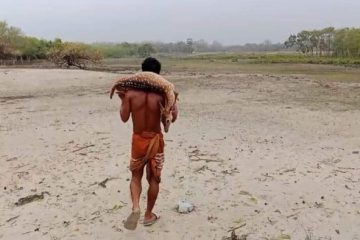Call for polls at all tiers, distance from Jamaat
Shahidul Islam Chowdhury
Grassroots level leaders of the Bangladesh Nationalist Party have urged the leadership to democratically revitalise the party, instead of imposing committees from above.
A section of the grassroots level leaders also suggested that the party should take a ‘right-of-the-centre position’ instead of being totally rightist.
‘It is an imperative that new committees are formed through vote by holding conferences at all levels after infusing fresh blood by picking up new workers in villages, wards, unions and upazilas, and wards, municipalities and city areas,’ said Mustafizur Rahman Babul, president of the party’s Melandaha upazila unit in Jamalpur.
‘The party should revise its constitution incorporating provisions for forming all committees stretching from the standing committee to the grassroots through ballot by respective electoral bodies,’ he said. ‘The party should groom dedicated leaders with clean image, who are also committed to the ideals of the party.’
He said the party should take a right-of-the-centre position instead of remaining tilted towards the right. ‘BNP’s founder Ziaur Rahman had pursued a right-of-the-centre politics upholding religious values, which is not necessarily restricted to Islamic values, to accommodate people of all faiths in the party. The party should not remain tilted towards the right.’
He expressed the views while participating in interview of the BNP’s grassroots level leaders in Dhaka.
The BNP has formed six committees for six divisions, led by joint secretaries general and organising secretaries, to interview the grassroots leaders and submit reports to the standing committee by February 28.
Khandakar Golam Mostafa, president of the party’s Sujanagar upazila unit in Pabna, said. ‘Imposing committees by the centre was a worn out practice to change grassroots level committees. But it did not benefit the party.’
Selim Reza Habib, general secretary of Sujanagar upazila unit and former lawmaker for the electoral constituency, said that most of the grassroots level leaders thought that former ministers and MPs and their close relatives, were responsible, among other reasons, for the plight of the party and its humiliating defeat in the December 29 general elections.
When asked whether the grassroots level leaders liked BNP’s inclination to close ties with religion-based parties, Habib, also a member of the party’s Pabna district unit – the home district of two top Jamaat-e-Islami leaders Matiur Rahman Nizami and Moulana Abdus Sobhan – said that many leaders had suggested that the BNP should keep a distance from the religion-based parties.
A few leaders said that maintaining relations with Jamaat-e-Islami was beneficial to BNP, he said.
Ashraf Ali, president of Mirzaganj upazila unit in Patuakhali, was more forthright. ‘The people do not take positively BNP’s close ties with a party led by war criminals.’
Many grassroots level leaders also suggested reorganising the party to get over the internal feuds fuelled by the ‘pocket committees’ led by former ministers and lawmakers, reducing dependence on religion-based political parties and nominating party candidates in all elections, including polls to the local government bodies.
Some grassroots level leaders also urged the top leadership to remain vigilant about persons who surrounded the party chairperson, Khaleda Zia, and the secretary general, Khandaker Delwar Hossain, in recent months.
Abdullah Al Noman and Mizanur Rahman Minu are in the team for interviewing grassroots level leaders in Dhaka division, Gayeswar Chandra Roy and Shamsuzzaman Dudu for Chittagong division, Nazrul Islam Khan and Kazi Asaduzzman for Sylhet, Selima Rahman and Mohammad Shahjahan for Khulna, Mirza Abbas and Aman Ullah Aman for Rajshahi and MA Mannan and Mashiur Rahman for Barisal.
The joint secretaries are seeking the local leaders’ opinions about the defeat of the party in the parliamentary and upazila elections, the state of the organisation and its committees at different tiers and about how the party can be strengthened in near future.
Selima Rahman told New Age Saturday, ‘The grassroots level leaders generally favour bringing about dynamism in the party together with forming committees by holding conferences at all levels.’
Mirza Abbas told New Age that the grassroots level leaders were giving views from their respective positions [after January 11, 2007] – splinter group [better known as reformists], conformists and those who have been inactive for quite some time.
‘We have asked them to bury the hatchet and work together,’ he said.
The party, which formed the government five times, won 30 seats in the 300-strong parliament securing 32.45 per cent popular vote in the ninth general elections.
Almost all the committees, excluding the national standing committee, of the BNP have served out their tenures as the party has not held elections to the committees in two years.
The party had held its last central council session 16 years ago in 1993. According to its constitution, it is supposed to hold the council every two years.
The party had held a representatives’ meeting with the participation of the members of the national executive committee in 2006.
Courtesy: newagebd.com




















